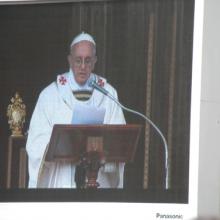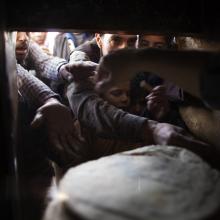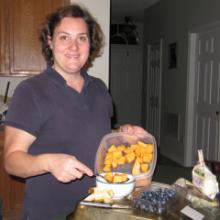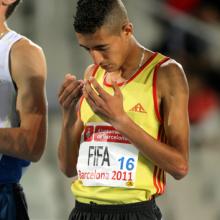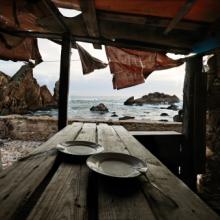fasting
Today is Ash Wednesday and the beginning of Lent. I grew up in a small evangelical church that only paid attention to the Christian calendar on Christmas and Easter. But over many years now, I have learned to celebrate the richness of all the Christian seasons from my friends in more liturgical traditions and from marrying a Church of England priest!
Lent offers us the much-needed spiritual preparation for Easter. Ash Wednesday is the place to begin; and that often includes fasting — in different ways and traditions. At Sojourners, we usually have a big staff pancake breakfast on Shrove Tuesday morning, the day before Ash Wednesday. But today, many of us are fasting.
Ash Wednesday doesn’t begin a hunger strike, but rather a season of self-examination, spiritual reflection, repentance, sacrifice, and focused prayer. Lent is a time to examine our hearts and lives, to acknowledge our sins, to look for the ways we are not choosing the gospel or welcoming those whom Jesus calls us to.

Photo via NAKASEC / Flickr.com http://www.flickr.com/photos/nakasec/
I completed my fast. I fasted for seven days as a participant in the Fast for Families: A Call for Immigration Reform & Citizenship. I fasted because Jesus cared about the "least of these" in his society, and as a follower of Jesus, I'm called to do the same. More specifically, I undertook this fast to raise awareness of these particular "least of these" in our society.
I was quite certain that some within my community of influence would disagree with me on this particular spiritual practice, whether theologically, politically, or socially. The pushback I did receive turned out to be more theological than anything. Perhaps that is just because of the circles I am in, but it went something like this, “I’m all for fasting as a personal spiritual thing, but associating it with a political cause is just wrong. Jesus came to save us from our sins and keep us individually out of hell.” The assumption is that Christianity has nothing to do with Public Square.
I'm still processing the political and governmental, not to mention partisan, implications of immigration reform. I'm certainly not under the impression that one simple bill at a federal level will "fix" immigration any more than the Civil Rights Act of 1968 fixed discrimination. Which of course is not to say that either is unimportant.
Do you believe in the spiritual realm? I mean really believe; not in your head — in your disciplines?
Do you believe that spiritual power can alter, transform, or even redeem social, institutional, structural and even legislative power?
I’ve been thinking a lot about this lately. I’m not sure I really believed … until recently.
On Sunday mornings, in the midst of our safe sanctuaries, our five-song worship sets, our 15-minute sermonettes and our one-hour services that can be timed with an egg timer, how does our worship and our practice offer witness to the reality of the spiritual realm? How do our disciplines engage the inner world beyond the good feeling we get from songs that comfort us? Comforting songs are valuable in our worship. In fact, God uses those songs to remind us of the ways the Holy Spirit interacts directly with us, knows us, and knows our most intimate needs. But how does our worship — how do our congregations’ spiritual disciplines strengthen our understanding and engagement with the powers, the principalities, and the world beyond our own homes and sanctuaries?
“For our struggle is not against enemies of blood and flesh, but against the rulers, against the authorities, against the cosmic powers of this present darkness, against the spiritual forces of evil in the heavenly places” (Ephesians 6:12).
In his book titled Fasting, Scot McKnight writes that a grievous sacred moment is what prompts us to fast and that moment is often caused by severe pain, suffering, or sorrow, which often includes the oppression of the innocent. This sorrow prompts us to focused prayer and fasting.
I entered a sun-up-to-sundown, water-only fast as part of the National Call to #Fast4Families on Dec. 3.
I fasted because of a strong conviction concerning the broken and unjust realities of the American immigration system. For our generation, immigration reform is a biblical justice issue.
As the least productive Congress in history begins to wind down its first legislative session, immigration reform is coming to a boil.
It’s already been 160 days since the Senate passed its immigration bill and the House already has 191 co-sponsors on its bipartisan bill. Still, House Republicans have failed to take the next step and have only voted on one immigration provision so far this year — Steve King’s (R-Iowa) amendment to defund DACA and deport DREAMers.
And with King (most famous for saying young immigrants have “calves the size of cantaloupes” from lifting 75 pound bags of drugs across the border) at the helm for Republicans on immigration, it’s no wonder that they’re getting nowhere on immigration.
But the tragic irony of all of this is that King’s own constituents (myself included) overwhelmingly support immigration reform. Recent polling by The American Action Network, a conservative outside group, shows that 79 percent of voters in his district support the tenets in the Senate Gang of Eight bill. Despite that popularity, King and his shrinking list of allies in the House have kept Speaker John Boehner (R-Ohio) from addressing the moral crisis afflicting millions of workers, children, mothers, and fathers.
(Editors Note: On Nov. 12, faith, immigrant rights, and labor leaders launched the “Fast for Families: A Call for Immigration Reform and Citizenship,” taking place on the National Mall. The following remarks are from Jim's speech given at the event.)
Despite the overwhelming public support — among all political stripes — to fix our broken immigration system, Washington's utter political dysfunction is blocking change.
It is time to pray and fast for a change that now feels like a "miracle." And that's what we now pray for. Pray against the racial fears and messages that are being used against immigration reform. Pray for courage and character on all sides — for Republicans who believe in an inclusive party and nation to stand up to Republicans who want an exclusive party and nation and for Democrats not to use this as a political issue for their self-interest. Pray for political leaders to do what few of them do well — to put other people's needs, especially poor and vulnerable people's needs, ahead of their own political agendas.
Pope Francis on Thursday told world leaders gathered in Russia for the G-20 summit that a military intervention in Syria would be “futile,” urging them to focus instead on dialogue and reconciliation to bring peace to the war-torn country.
The Argentine pontiff’s first major foray onto the global stage comes as the U.S. Congress prepares to vote on a military strike against Syria in response to a reported chemical weapons attack outside Damascus on Aug. 21.
For Francis, just six months on the job, the Syria question will test his ability to summon the power of his global bully pulpit and could play a major role in shaping the global image of a man who’s drawn more attention for his down-to-earth pastoral appeal.
“Is not this the kind of fasting I have chosen: to lose the chains of injustice and untie the cords of the yoke, to set the oppressed free and break every yoke?” wrote the ancient prophet Isaiah (58:6). As Christians around the world enter the season of Lent, the challenge of the prophets is to not enter into empty rituals, but to recommit ourselves to fearless acts of justice.
This Lent Christians are standing in solidarity with Syrians by joining a rolling fast launched by Pax Christi International. The acute suffering of civilian communities in Syria has been made immeasurably worse by a shortage of bread, Syrian’s staple food, caused in part by the deliberate bombing of bakeries.
Open to anyone concerned about the anguish of local communities caught in Syria’s civil war, the campaign, called “Bread is Life – Fast for a Just Peace in Syria,” is a direct response to the fact that many Syrians feel abandoned by the rest of the world.
Amy Lester has followed Jesus for decades, but her keen appreciation for his sacrifice on the cross came only recently when she started eating like the prophet Daniel.
During Lent, which starts Feb. 13, the 40-year-old mother of two keeps a type of Daniel Fast, which involves eating only food from seeds (vegetables, fruits, unleavened grains), drinking only water and practicing daily devotions.
A similar regimen kept Daniel and his friends free from corruption in King Nebuchadnezzar’s Babylonian court, according to the Bible. Now the Old Testament example guides growing numbers of Christians in the 40-day period of preparation for Easter.
“We set apart a sacrifice in Lent in order to identify, even the smallest (bit), with what Jesus sacrificed for us,” said Lester, who attends University Carillon United Methodist Church in Oviedo, Fla. “He died for me. The least I can do is to sacrifice the foods that are comforting to me.”
It was the summer of 1994 and about 10 friends and I sat huddled around Bibles in my friend’s living room. It was a “scripture party.” The lights were dim and the air was full of anticipation and mystery. We did not know what God might reveal as we opened the book of Revelation and read it out loud, in community, in one night.
This bears resemblance to the way the early church would have read the scripture. They were an oral culture, not a written one. The Hebrew Bible was written on scrolls that were read aloud to congregations. Most of the New Testament was written as letters to the worshiping bodies of whole cities (i.e. the saints in Ephesus, the church in Philippi, the body in Corinth, etc.). When received, the letters would be read out loud to the whole church community and received as God’s instruction revealed through the apostles for the edification of their communities.
Imagine being one of the very first followers of the Jesus “Way” (Acts 9:2).
Imagine being a persecuted religious group. You have to use code — the sign of the ichthys — to identify yourself to other believers for fear of religious persecution. Only when you are gathered together in secret can you speak openly about your faith. Only then can you be fully known and appreciated for the whole image of God that lives inside of you.
Imagine huddling in a secret meeting place and reading the Apostle John’s Revelation of Jesus Christ for your nascent faith community in Ephesus or Smyrna, or Pergamum, or Thyatira, or Sardis, or Philadelphia, or Laodicea (Revelation 2-3). Imagine living in Ephesus and reading Paul’s prayer for your church to understand its hope and inheritance (Ephesians 1:17-2:22).
And imagine being rich in the early church and hearing James’ letter warning: “Listen! The wages of the laborers who mowed your field, which you kept back by fraud, cry out, and the cries of the harvesters have reached the ears of the Lord of hosts.”
Imagine hearing it all for the first time. It all feels so real. The call to holiness feels so urgent because God feels so present.
I’m on day 14 of my Ramadan fast — almost the halfway point. My schedule has been so scattershot with travel that I haven’t been able to make it to a mosque yet. Nonetheless, lightheadedness brought on by lack of water and sleep has become my new normal.
I asked Daisy Khan, Imam Feisal’s wife and the Executive Director of the American Society of Muslim Advancement: “What about sleep? How do people do it?” She explained, during Ramadan we live like angels. Angels don’t need sleep. They don’t need food or water.
“But how do they do it, physically?” I pressed.
“Spiritual energy,” Daisy said.
After two days of deep and unwavering pangs of hunger and thirst that had to wait for sundown to be filled, I had an epiphany: In the same way that I waited eagerly for the breaking of the Ramadan fast each night — counting it as something to celebrate — on the day Jesus comes again, we will celebrate. On that day there will be no injustice anymore. Imagine it! There will be no hunger anymore! There will be no one who is thirsty anymore! All will have their fill! All will taste the sweetness of life! All will be free of oppression! All will be able to laugh and play, and no one will be lonely any more.
Then it struck me: Ramadan offers an emphatic example of what is to come. Just as the community of creation suffers and groans waiting for all the relationships broken at the Fall to be made right again (Romans 8:18-23), so the communities that practice Ramadan suffer and grow together each day, waiting for their very bodies to be made right again each night through the intake of food and water.
It’s just 10 days until the biggest show on earth begins.
No, not Lady Gaga’s new tour. It's the 2012 Summer Olympics in London.
The timing of this year’s Olympics has put thousands of participating athletes in something of a quandary.
Writing from TIME Magazine, Aryn Baker explains:
When an estimated 3,500 Muslim athletes come to the London Olympics this summer, the pinnacle of their athletic careers will directly coincide with one of the most important periods in their spiritual calendar. This year, all 17 days of athletic competition take place during the holy month of Ramadan, when Muslims are required to fast and refrain from drinking water from sunrise to sunset....
In February of 2009, when I tried a month-long Ramadan fast for the book Flunking Sainthood, I felt like a failure for most of the month.
Fasting was not a practice I ever cheated on (weirdly, it was easier for me to give up food completely in February than it was just to be a vegetarian in October of that year, when I did cheat -- how lame is that?). But I never felt like I fully "got" it. I did feel unexpectedly relaxed at the end of February -- and, let's face it, a bit smug that I'd persevered through the experience -- but not much more spiritual than when I started.
I think it's because I had the wrong attitude to begin with.





